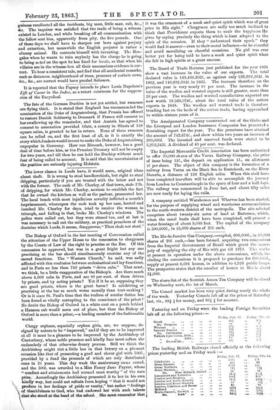The Bishop of Oxford in the last meeting of Convocation
called the attention of the Upper House to the concession to clergymen by the Courts of Law of the right to practise at the Bar. Of this concession he approved, but was in a great fright lest any one practising at the bar should simultaneously exercise any of the -sacred functions. The "Western Church," he said, was sadly afflicted with this confusion between ecclesiastical and lay functions, and in Paris no less than 750 priests "drive cabs." That must, we think, be a little exaggeration of the Bishop's. Are there much above 4,000 cabs in Paris, and are 20 per cent, of them driven by priests, and by acting priests? Yet if it be so, supposing they are good priests, where is the great harm? Is cabdriving or practising at the bar so much worse morally than tent-making ? Or is it since St. Paul's time that the realism of secular duties has been found so vitally corrupting to the conscience of the priest? No doubt the Bishop of Oxford in a white coat on a perch behind a Hansom cab would seem out of place, but then the Bishop of Oxford is more than a priest,—a leading member of the fashionable world.


































 Previous page
Previous page